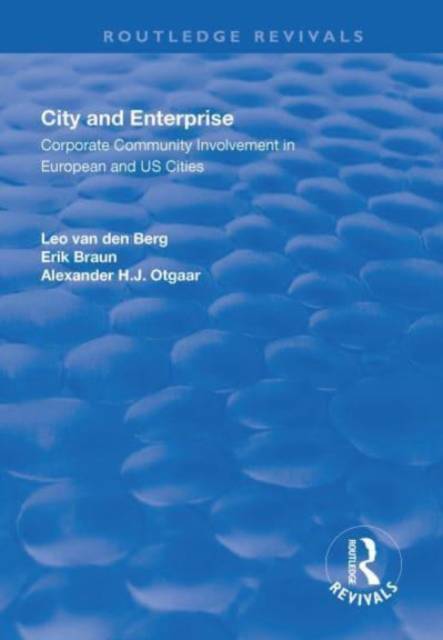
- Afhalen na 1 uur in een winkel met voorraad
- Gratis thuislevering in België vanaf € 30
- Ruim aanbod met 7 miljoen producten
- Afhalen na 1 uur in een winkel met voorraad
- Gratis thuislevering in België vanaf € 30
- Ruim aanbod met 7 miljoen producten
Zoeken
City and Enterprise
Corporate Community Involvement in European and Us Cities
Erik Braun, Leo Van de Berg
€ 45,95
+ 91 punten
Uitvoering
Omschrijving
This title was first published in 2003. While in the past, corporate community involvement was mainly considered a form of philanthropy, nowadays the argument is gaining credit that corporate community involvement is not only a matter of ethics, but also of self-interest. As companies recognize their interest in the welfare of the city, they may become inclined to invest in some way in that city's welfare. Assuming that the interests of public and private stakeholders tend to converge as companies become aware of their interest in an attractive environment, then corporate community involvement may bring along a new type of public-private partnership, as an instrument of urban regeneration. Bringing together comparative case studies from Amsterdam, Chicago, Leeds, London, Munich, New York, Seattle, St. Louis and The Hague, this considers the potential implications of corporate community involvement for the sustainable development of cities and the creation of cross-sector partnerships. It analyses the involvement of companies in urban challenges in the fields of education, employment, safety, affordable housing and the living environment. It also looks at the efforts made to establish strategic partnership between "enlightened" corporations and public authorities. The book reveals that "pro-active" firms attach much value to investments in their "urban environment" as part of their corporate strategy. But it also shows that cities do not yet take full advantage of these arising opportunities.
Specificaties
Betrokkenen
- Auteur(s):
- Uitgeverij:
Inhoud
- Aantal bladzijden:
- 226
- Taal:
- Engels
- Reeks:
Eigenschappen
- Productcode (EAN):
- 9781138711433
- Verschijningsdatum:
- 11/11/2019
- Uitvoering:
- Paperback
- Formaat:
- Trade paperback (VS)
- Afmetingen:
- 152 mm x 219 mm
- Gewicht:
- 417 g

Alleen bij Standaard Boekhandel
+ 91 punten op je klantenkaart van Standaard Boekhandel
Beoordelingen
We publiceren alleen reviews die voldoen aan de voorwaarden voor reviews. Bekijk onze voorwaarden voor reviews.











